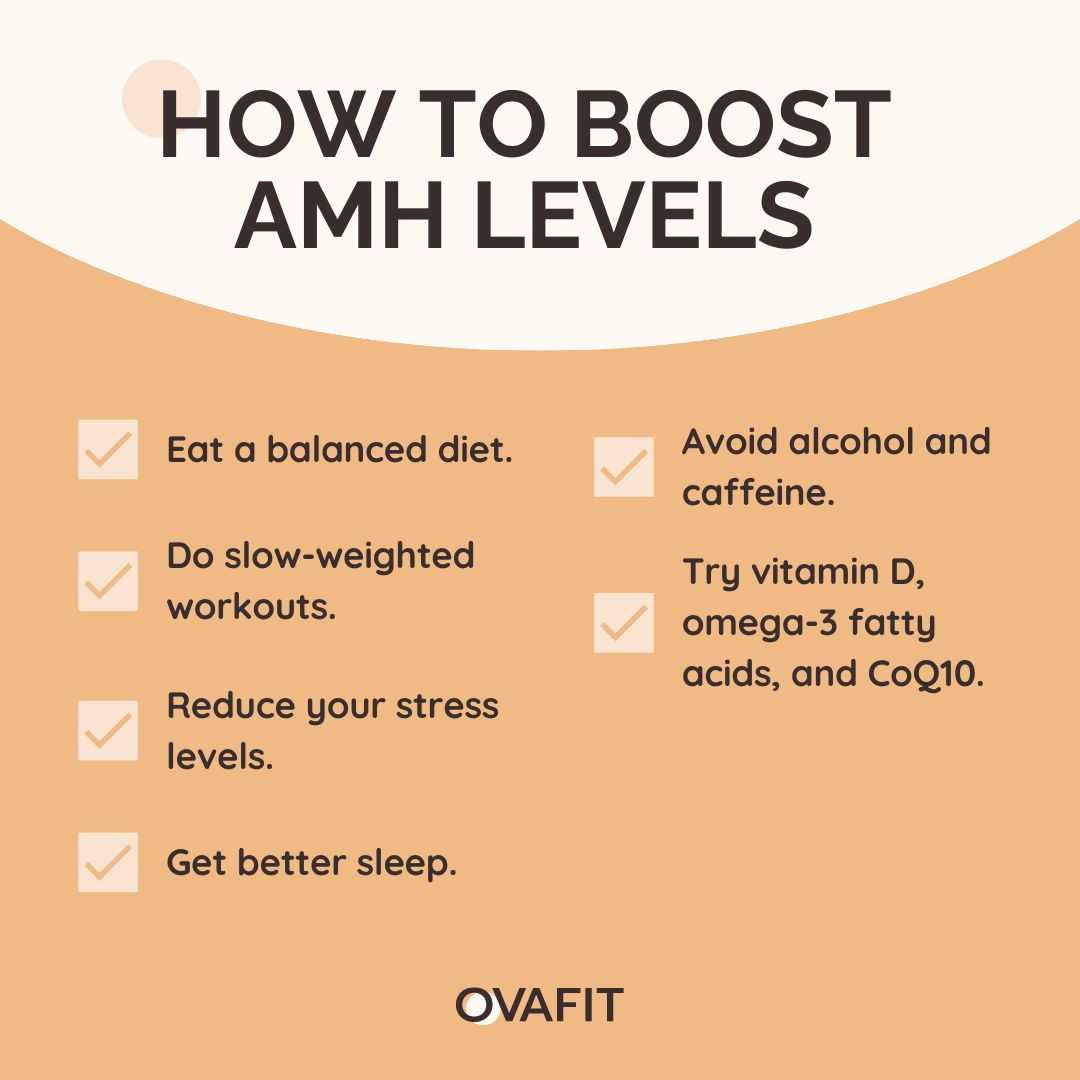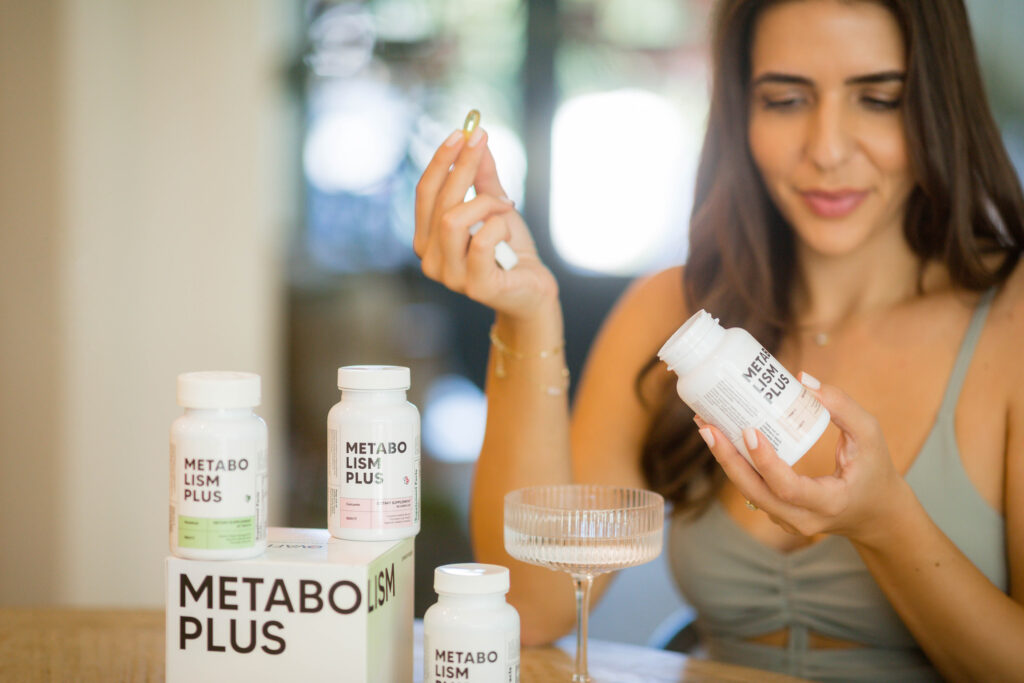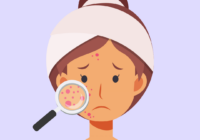
Polycystic ovary syndrome (PCOS) is a common hormonal condition in women that can come with a lot of chronic struggles. One of the most well-known symptoms is PCOS’ impact on reproductive health and fertility. In fact, up to 80% of Cysters struggle to get pregnant.
The fluctuations and imbalances of your hormones can impact almost every stage of your menstrual cycle, conception process, and pregnancy journey. However, there is still a lot of hope! Despite what you might have heard at your doctor’s office or on the internet, you can conceive naturally with PCOS.
With the right lifestyle changes, you can get to the root of your hormonal imbalances and create a better environment in your body for conception! Some of the main hormones we will focus on are testosterone, estrogen, progesterone, and anti müllerian hormone (AMH).
After today, you will be an expert on what the AMH hormone is, what it’s used for, why elevated levels are a problem, and how to avoid keeping levels too low. Let’s get started!

How to Increase AMH Hormone Levels: What You Need to Know
AMH is a hormone that can be problematic if it’s too high or too low. If you get your AMH levels tested through your labs (which I recommend you discuss with your doctor), and they’re elevated, you can jump over to my post on how to decrease AMH hormones in PCOS. However, there are lots of natural ways to increase it as well! Keep on reading to learn more!
AMH and PCOS: What’s the Connection?
Here’s the thing, most women with PCOS have high levels of AMH. AMH is a hormone released by the ovaries and indicates the number of eggs you have in your ovarian reserve. You may think, “More eggs means better fertility, right?” Unfortunately with PCOS, this isn’t always the case.
With PCOS, the eggs or follicles in the ovaries often don’t mature and ovulate like they’re supposed to. This is due to other hormonal imbalances like high testosterone, high estrogen, and low progesterone. So, high AMH doesn’t always mean great egg quality and better fertility.
Though most women with PCOS have high AMH levels, we all know that every Cyster’s body is different. WAY DIFFERENT! So, whereas many women with PCOS will experience high AMH, there are those of you dealing with low AMH, which also negatively impacts fertility. Increasing AMH will mean the potential for more eggs in the ovarian reserve with the potential of fertilization!
So, what we’re looking for is an AMH sweet spot that’s not too high or too low. To help you improve your ovarian reserve and fertility, I’ll share some tips below to increase your AMH levels if they’re too low!

What is a Good AMH Level? AMH Levels Explained
A “good AMH level” depends on different factors (like age), but for women of reproductive age our anti müllerian hormone levels should be between 1.0 – 4.0 ng/mL. However, the average AMH level for a Cyster is 6+ ng/mL. A big difference!
But, again, not everyone with PCOS is the same, and many Cysters may be dealing with AMH levels under the healthy average. The goal here is to raise AMH or lower AMH to get to that 1.0 – 4.0 ng/mL sweet spot.
If you’re unsure if decreased AMH levels or increased AMH levels are affecting your fertility, I recommend you talk to your doctor about getting an AMH test performed. Then, you can start the work of improving your ovarian function and overall reproductive health.

Exactly How to Boost AMH Levels
Eat a balanced diet.
When you’re managing AMH levels naturally, you need to look at the big picture of your overall health. If you’ve been with Sirak and I (aka your PCOS personal trainer and PCOS registered dietitian) for a while, you know that three things are contributing to a lot of your PCOS symptoms (including infertility): inflammation, insulin resistance, and hormonal imbalances. Each one influences the other and keeps your body in a state of fight or flight, preventing it from functioning optimally.
Studies suggest a healthy diet can have an incredibly healing effect on all three of these root issues and your overall fertility! I recommend a gluten- and dairy-free anti-inflammatory diet. It can give your body the fuel it needs without increasing inflammation and can help you manage your insulin levels. With the right changes, you can see big changes in your weight, fertility, and pretty much all your PCOS symptoms! For more resources and a ton of PCOS-friendly recipes, download The Cysterhood app.

Do slow-weighted workouts.
Exercise, like diet, can improve your overall health in so many ways. Not only can it help you lose weight and build muscle tone, but it can also improve your reproductive health. However, you don’t want to do just any workout if you have PCOS.
Slow-weighted workouts should be your go-to, because they work out your entire body without pumping your body full of adrenaline and cortisol (AKA stress hormones), which can lead to inflammation, insulin resistance, and even more hormonal imbalances. So, keep it slow and low impact! You can find lots of approved exercises on The Cysterhood app as well!

Reduce your stress levels.
Stress can do a number on your body and overall fertility! The stress hormones disrupt normal hormone function and can actually create a domino effect throughout your body, preventing normal hormone balance necessary for conception. This is likely why studies show women with high stress have lower AMH levels and fewer eggs in their ovarian reserve.
So, to increase your AMH levels again and improve your fertility, do everything you can to reduce stress! Exercise and diet will do wonders for your stress levels, but also practicing self-care, trying meditation, and creating a routine that helps you unwind!
Get better sleep.
Sleep is essential for hormone balance in the body. Important processes happen while we’re going through our sleep cycle that help us regulate our hormones during the day. So, for AMH hormone levels to be in the right range, we need regular good quality sleep! Plus, sleep can improve stress levels, which directly impact AMH levels.
And, yes, I know good sleep with PCOS is not always the easiest. We’re way more likely to experience sleep disturbances than a woman without PCOS. However, there are ways you can make it easier on yourself. Here are some ways to better sleep with PCOS.
Avoid alcohol and caffeine.
Neither alcohol nor caffeine are great for your overall health. Mixed drinks that typically have high amounts of sugar, which isn’t good for insulin resistance, can also hinder the liver’s ability to break down excess hormones. Studies actually show that alcohol is associated with lower AMH levels as well.
Caffeine, on the other hand, pumps our bodies full of cortisol (stress hormones), which we already know is bad for AMH levels and reversing our PCOS symptoms! So, reduce your alcohol and caffeine intake to raise those AMH levels! PS. I recommend switching out your morning joe for a cup of Testosterone Relief Tea!

Try vitamin D, omega-3 fatty acids, and CoQ10.
One of the best things you can do for your fertility and your healing journey is to take high-quality, PCOS-friendly supplements. My supplements, Ovafit, are specially designed to be the best possible for our unique bodies.
Many of the vitamins and minerals included in my supplements can specifically help improve reproductive health factors including AMH levels! Specifically, studies suggest vitamin D, omega-3 fatty acids, and CoQ10 may give your AMH levels the boost they need and these are all included in my Metabolism Plus bundle! Here is a list of other supplements to improve fertility that I recommend you discuss with your doctor.

Getting your AMH levels in a good range can help increase your chances of conceiving.
When you’re a woman with PCOS, the infertility that comes with this condition can be one of the most heartbreaking things. However, you don’t have to accept your reproductive health as is. You have the power to naturally improve your fertility, reverse your symptoms, and find healing.
If you want more ways to start improving your reproductive health, head over to my PCOS Weight Loss blog and tune in regularly to the A Cyster and Her Mister podcast!






Related posts
Can PCOS Cause Hair Loss?
High Cortisol and PCOS: Everything You Need to Know
10 Teas for Hormonal Imbalance in PCOS
6 Signs of Hormonal Imbalance After Pregnancy with PCOS
PCOS Bloating During Ovulation: What You Need to Know
How To Lower Cortisol With Supplements
Should You Take Chromium For PCOS?
How Much CoQ10 Should You Take For PCOS?